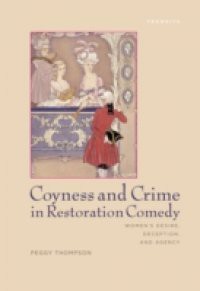Coyness and Crime in Restoration Comedy examines the extraordinary focus on coy women in late seventeenth-century English comedy. Plays by Etherege, Wycherley, Dryden, Behn, Shadwell, Congreve, Trotter, Southerne, Vanbrugh, and Pixas well as much modern scholarship about themtaint almost all feminine modesty with intimations of duplicity and illicit desire that must be contained. Forceful responses by men, therefore, are implicitly exonerated, encouraged, and eroticized. In short, characters become ';women' by performing coyness, only to be mocked and punished for it. Peggy Thompson explores the disturbing dynamic of feminine coyness and masculine control as it interacts with reaffirmations of church and king, anxiety over new wealth, and emerging interests in liberty, novelty, and marriage in late seventeenth-century England. Despite the diversity of these contexts, the plays consistently reveal women caught in an ironic and nearly intractable convergence of objectification and culpability that allows them little innocent sexual agency. This is both the source and the legacy of coyness in Restoration comedy.

